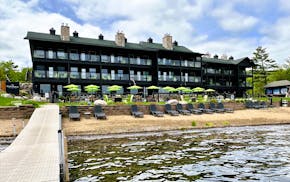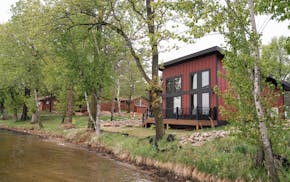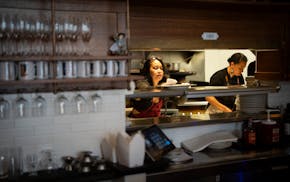When Owamni opened in 2021, chef Sean Sherman and his nonprofit NATIFS (North American Traditional Indigenous Food Systems) were "shooting high for what's possible for what we do with modern Indigenous foods," he said. They didn't just hit the high mark, they shot for the stars and won a James Beard Award for Best New Restaurant in America.
So when it came time to open a new concept, the celebrity chef decided to come back down to earth, harnessing smoke and fire to showcase traditional barbecue techniques and ingredients at the forthcoming ŠHOTÁ Indigenous BBQ.
"We wanted to do something a little bit different, a little bit fun," Sherman said.
NATIFS has acquired the historic Seward Co-Op Creamery building at 2601 E. Franklin Av. in Minneapolis, and will open NATIFS Wóyute Thipi (which means "food building"). The multiuse building will become home to NATIFS' headquarters, house a commissary kitchen to supply Minnesota schools and hospitals with Indigenous foods, offer a co-working space, and become the site of the 80-seat counter-service restaurant.
"It'll be a lot of things people are kind of familiar with: Native baked beans, dirty wild rice, sweet potatoes and all the smoked games meats and birds and fish," Sherman said. "It just really fits into what we do, showing there are other concepts out there that we can continue to do in our style, keeping things healthy, prioritizing purchasing from Indigenous producers and opening up more jobs."
While the offerings are more streamlined and at a lower price point than Owamni's tasting menus, dining at ŠHOTÁ will provide a fuller experience than NATIFS' other outlet, the counter-service and grab-and-go Indigenous Food Lab at Midtown Global Market, which is staying at its present location.
ŠHOTÁ will have a beer and wine list that promotes BIPOC producers, and many dishes will come family style. It will give the Seward neighborhood a new spot for brunch. "We want it to be a comfortable place for people to come in big groups or even by yourself," Sherman said.
ŠHOTÁ is the Dakota word for smoke or clouds, the same as the -sota in Minnesota. "It fit in perfectly for the barbecue thing," Sherman said.
Originally, NATIFS was looking at leasing the creamery building, but the conversations developed into a sale.
"I just thought, this would be a such a great anchor for the corridor on Franklin, to create a food-focused building to continue the work that we're doing, and to find a second-generation kitchen like it has and an opportunity to open up another restaurant concept and be the heart of our operations — it had everything we needed, and we can really bring a lot of impact into that neighborhood close to the Native community that lives right there."
Located less than a mile from the Minneapolis American Indian Center, also on E. Franklin Avenue, NATIFS Wóyute Thipi keeps the organization's work in a district that's home to a cluster of businesses and institutions serving and celebrating the Native American community.
"It's very exciting to welcome Sean Sherman and NATIFS Woyute Thipi to East Franklin Avenue," said Robert Lilligren (White Earth Ojibwe) of the Native American Community Development Institute. "Sean's community-based, groundbreaking work with Indigenous, healthy food will enhance the strong Native presence on the American Indian Cultural Corridor."
A dairy cooperative since 1921, the creamery building and the Franklin Cooperative Creamery Association that occupied it supplied 80% of the Twin Cities' milk at the height of its operations. At other times, the building housed a medical supply company and a Harley-Davidson dealership. Seward Co-op purchased the building in 2022.
"Seward Co-op is grateful to have participated in the history of the building at 2601 East Franklin, but it is more than an honor to know that NATIFS will now occupy it," said Ray Williams, Seward Co-op general manager. "Its mission is aligned with Seward Co-op and will provide food access to those in the community and surrounding areas. We warmly welcome NATIFS Wóyute Thipi to the neighborhood."
In addition to this local expansion, NATIFS is working with farther-flung communities to open similar institutions that promote Indigenous food systems. They're currently working with Montana State University to open a restaurant concept in that state, and are aiming to build future "support centers" in cities like Anchorage, Seattle, Portland, Albuquerque and more.
"We're seeing restaurants as a benefit for the nonprofit because it creates the jobs, it moves the food products and it gives people the experience and attracts the attention of the work that we do," Sherman said.
Look for ŠHOTÁ Indigenous BBQ to open in mid-2025; more information at natifs.org.
Review: 'Between Riverside and Crazy' socks it to you and more

Quarterdeck Resort's stylish revamp is part of a boutique wave in Minnesota lake country

The newest Karate Kid fell in love with movies while growing up in Minnesota

What's new at Minnesota resorts this summer
